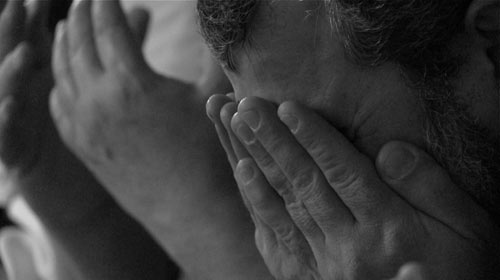As I mentioned before, I will be blogging from the Annual Meeting of the American Academy of Religion. While I am aiming to report specifically on the Esoteric Studies group while here, I’ll be updating Zero Equals Two readers with reports on research that might be of interest.
This morning opened with an interesting Ritual Studies session focused on ethnographic film covering rituals of exorcism and spirit possession. The centerpiece of the session was a screening of a film called “Descending with Angels,” by a Danish ethnographer named Christian Suhr, who skyped in to both introduce the film and to provide comments and field questions from the audience. It was a fascinating film, with substantive footage of Muslims experiencing possession by Djinn or Shaitan and a particular Imam performing exorcisms. This was coupled with therapeutic sessions with psychiatrists who are addressing the experience of possession primarily through the use of psychiatric medicine.
This film was part of Suhr’s doctoral work, which also includes a dissertation providing the more academic analysis. Suhr framed his research as examining the intersection of and tension between two worlds, the psychiatric world of contemporary secular Danish culture and the traditional Islamic world of the Danish Salafist Muslims. He forwarded an interesting thesis that, in both cases, the ritualized actions, whether it was the recitation of the Qur’an over the possessed individual or the ritualized distribution of medication with the nurse, worked primarily to remove the agency of the possessed individual, to put them into a state of submission to the cure whether that cure is anchored in a Islam or the medication.
Marco Pasi asked an interesting question during Q&A about the placebo effect, and who much the cure operates through hat placebo effect. What I think was interesting about Suhr’s analysis is that he didn’t frame the efficacy of the placebo in terms of belief in the cure, but rather in submission to the moral world behind the cure, either a moral world of submission to the Will of God or the moral world of secular, autonomous individual. The conflict between these worlds is less about the method of the cure, then the sense of of what constitutes, in Suhr’s words, “the good life,” the way of being that constitutes the outcome of the cure.
He further elaborated during question and answer describing a battle between the patient and the Djinn is taken up into a larger battle, where all of these kinds of conflicts are really a part of a universal creation to which this conflict is submitted. There is a universal vision of which this moment is just a part. Suhr suggested that the power of the exorcism then comes from diminishing the significance and reality of the particular conflict in the possessed, where the only outcome is submission to God. Similarly, the patient must submit to what Suhr described as the voice of science and psychiatry, a universal that stands behind the pill, to which the patient must submit.


One Comment